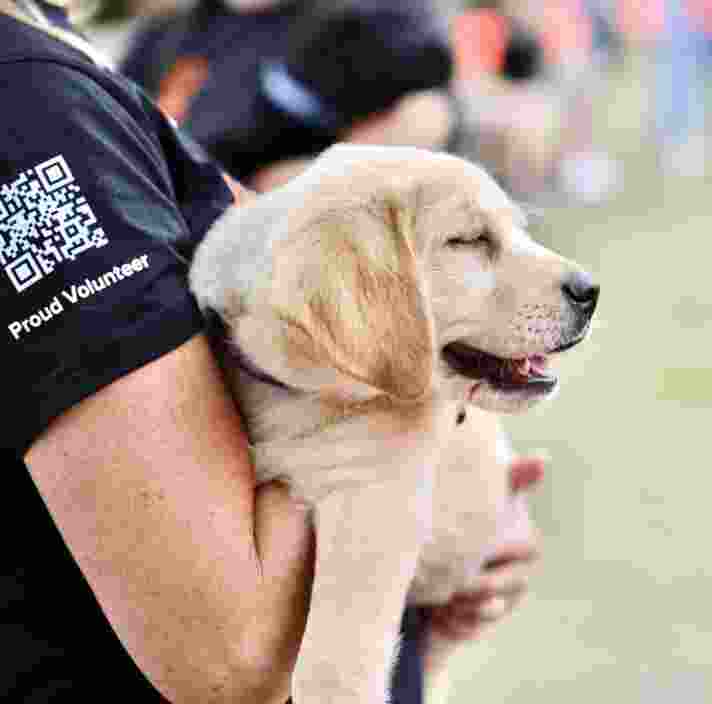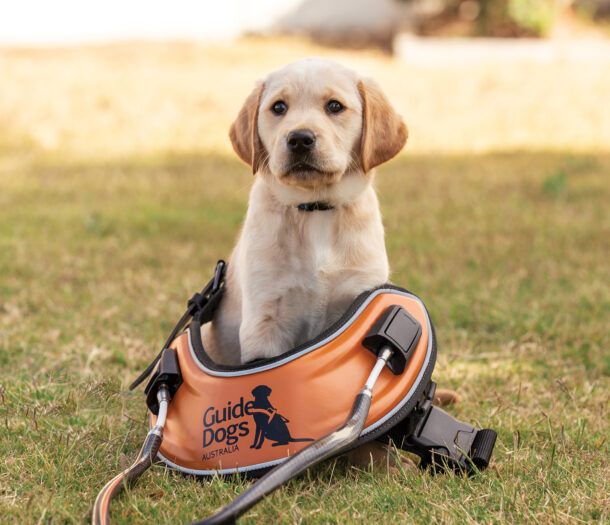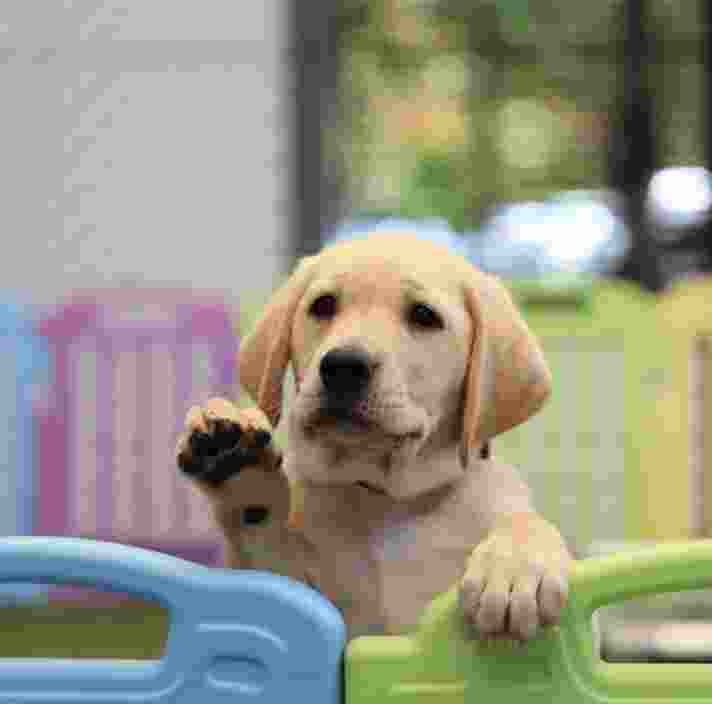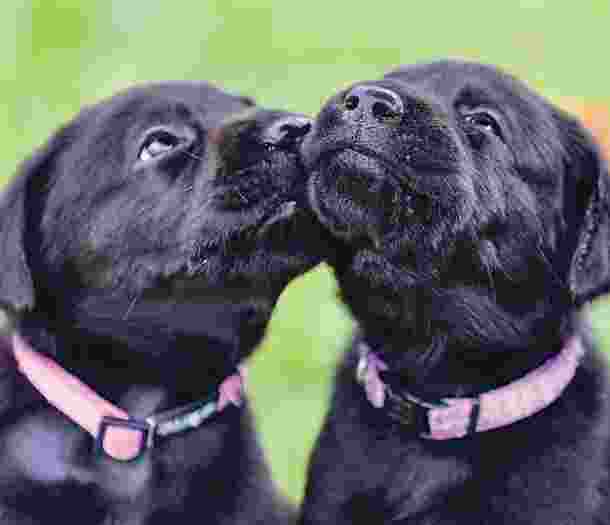On this page:
Introduction to the Role
As a Puppy Raiser with Guide Dogs Queensland, you’ll welcome a pup into your home for six months, guiding them as they learn good manners, basic skills, and everyday confidence.
Your care will shape a future Guide Dog who will change someone’s life. No prior dog experience is needed – our Puppy Development Team provides full training, resources, and covers all costs.
This role suits a wide range of households, including families, singles, pet owners, people working from home, retirees, couples, and friends. Be part of a journey that changes lives – your pup’s, and the person they will guide.
Understanding the Commitment
At Guide Dogs Queensland, the journey to becoming a Guide Dog begins at just 8–10 weeks of age. Our pups are placed with volunteer puppy raisers who provide a loving home and early training to set them on the path to becoming life-changing companions for people with low vision or blindness.
Puppy raising is a unique and rewarding experience. As a raiser, you’ll watch your pup grow in confidence and ability, knowing you’ve played an essential role in their journey to becoming a Guide Dog.
In this role, you’ll provide a safe, structured home environment where your pup can learn basic skills, good manners, and social confidence. The pup becomes part of your daily routine, joining you in a variety of environments while receiving consistent guidance and care. You’ll also attend regular weekday training sessions with our Puppy Development Team and follow set routines for feeding, toileting, and sleeping.
To become a Puppy raiser, you’ll need to:
- Live in the council areas of Brisbane, Moreton Bay, Gold Coast or Sunshine Coast. This is to ensure your pup can attend regular training sessions with the Puppy Development Team.
- Be home for most of the day: your pup must not be left alone for more than four hours at a time without supervision and human company.
- Be available to walk your pup each day.
- Allow your pup to sleep and spend time indoors.
- Have a yard with dog-proof fencing unless you live in a flat or unit.
- Have a drivers licence and access to a car to transport your pup.
- Be available to attend weekday training sessions.
I work full time. Can I still become a puppy raiser?
Yes – if you work from home or have flexible hours, puppy raising can be a great fit. Many of our Puppy Raisers work remotely and enjoy having a puppy as part of their daily routine. You may also be able to bring your puppy to work, depending on your work environment and the suitability of the pup.
It’s important to know that puppies can’t be left alone for more than four hours at a time, and you’ll need flexibility during the week to attend training sessions, daily walks, and socialisation activities.
If you work from home or have flexible hours, we’d love to chat about your situation and help assess if puppy raising is the right fit for you. It’s a one-of-a-kind opportunity to make a lasting difference – with your love, time, and guidance, you’ll help a young pup grow into a confident Guide Dog and change someone’s life forever.
Responsibilities
Raising a future Guide Dog is a rewarding and life-changing experience, but it comes with real responsibility. It’s important to ensure you’re able to meet the needs of the pup and support their development into a confident and capable Guide Dog.
Your Time Commitment
Do you have the time and consistency to raise a puppy?
- Are you able to commit to daily training and exercise, including walks, obedience sessions, and establishing good house manners such as calm greetings and polite behaviour at the door?
- Can you attend regular training sessions and outings during weekday business hours?
- Are you committed to spending a large portion of your day with the pup, integrating it into your daily life? This includes ensuring the pup is not left alone for more than four hours at a time.
- Are you ready to toilet train the puppy following guidance from your puppy raiser Educator?
- Can you provide socialisation opportunities at least 3–5 times a week in varied environments? These can be short (5–15 minute) experiences woven into everyday life, like school drop-offs or errands, where the pup can encounter various noises, people, floor surfaces, and other animals.
- Do you have a drivers license and car to transport your pup?

Looking After Your Own Safety
Are you physically able to raise a growing puppy?
- Can you physically handle a 30–40kg dog on lead?
- Are you able to carry out repetitive physical tasks such as bending, lifting, kneeling, and squatting?
Ensuring the Puppy’s Safety
- Creating a secure and nurturing environment is essential.
- Is your fencing and yard secure, keeping the pup in and other animals out—particularly when the pup is not yet desexed?
- Are you prepared to puppy-proof your property? This includes:
- Removing all hazards like baits, safe relocation of chemicals medicines, and moving electrical cords and other potential hazards.
- Relocating or blocking access to any dangerous plants.
- Ensuring fencing is secure around pools or elevated spaces to prevent falls.
- Fencing off areas with access to decorative rocks/river stones or removing them from the property.
- Do you have suitable outdoor shelter that protects the pup from sun, rain, and heat?
- Are you committed to always keeping the pup on lead or supervised within a safely fenced area when outdoors? (Our dogs cannot be left outside unsupervised).
- Is your entire household on board with puppy safety practices, such as removing small objects that could pose a choking hazard and closing gates and doors securely?
- Will you follow veterinary direction to maintain the pup’s health and wellbeing, and ensure all preventative treatments are administered on time, under Guide Dogs Queensland’s guidance?
- Are you able to do health checks (we will show you how) and groom the pup daily?
- Will you prioritise the pup’s safety at home and during outings, remaining alert to potential hazards like traffic, cyclists, or crowded areas?
Household Expectations
Raising a pup is a team effort—everyone at home needs to be on board.
- Is every household member in agreeance with raising a pup, and willing to follow all guidelines set by Guide Dogs Queensland ensure consistent handling?
- Is anyone in the home allergic to, fearful of, or uncomfortable around dogs?
- Do you have other pets, and are they likely to adapt well to having a puppy in the home?
- Are you willing to ensure that our criteria for house manners are followed, even if they differ from what your own pets are used to?
- Is your household prepared to manage toileting accidents and general clean-up as part of the experience?
- Prior dog ownership is not essential as long as you are happy to learn and follow Guide Dogs QLD guidelines, your Puppy raiser Educator will support you with all the guidance and training you need.
Please note: We do not recommend introducing another puppy into the household while caring for a Guide Dogs Queensland pup, to ensure focus is maintained on the pup and our training program.

Staying Focused on the Mission
Raising a Guide Dog is a meaningful contribution to the lives of people with low vision or blindness.
- Are you prepared to follow Guide Dogs Queensland’s training and handling methods, even if they differ from techniques you’ve used with your own pets?
- Can you commit to the full puppy raising journey, working closely with your Puppy raiser Educator and the wider Guide Dogs Queensland Team?
- Are you able to respond to communications in a timely manner? While email is preferred, we will work with you to ensure you’re kept informed and supported throughout.
- Do you have reliable internet access? Having access to our online platform is essential to you partaking in the Program.
Supporting the Pup’s Health and Development
Keeping the pup healthy and happy is essential to their growth.
- Are you able to monitor the pup’s wellbeing and report any concerns to Guide Dogs Queensland staff promptly?
- Can you administer veterinary treatments as advised by Guide Dogs Queensland staff or our approved veterinarians?
- Will you maintain the pup’s weight and physical condition in line with Guide Dogs Queensland guidelines?
- Are you able to establish and maintain consistent feeding, sleeping, and toileting routines?
- Can you ensure the pup is walked and exercised daily to support their development?
Shaping Behaviour Through Positive Training
Behavioural development is at the heart of our program.
- Are you committed to following Guide Dogs Queensland’s approved techniques for handling, training, and socialisation?
- Can you attend all scheduled training sessions with the pup—typically weekly at first, then fortnightly?
- Are you ready to teach foundational skills such as “sit,” walking nicely on a lead, and comfortable body handling?
- Can you teach the pup good house manners, including staying off furniture and greeting others politely?
- Will you regularly socialise the pup and expose them to a variety of environments and experiences in a positive, encouraging way?
Please note: Failure to follow these responsibilities may result in Guide Dogs Queensland making the decision to remove the pup and place it with another raiser.

Guide Dogs Queensland’s Responsibilities
We’re here to guide and support you throughout your journey.
- Treat puppy raisers, volunteers, and members of the public in a respectful, friendly, and considerate manner.
- Treat every pup and dog with care and kindness, using modern training approaches that reflect the latest in best-practice.
- Prioritise the wellbeing and comfort of each pup in all interactions. Staff will tailor their training to suit the individual pup’s comfort and capabilities, ensuring a safe and positive learning experience.
- Support puppy raisers by clearly communicating the techniques, expectations, and practices recommended by Guide Dogs Queensland for puppy handling, training, and social experiences.
- Keep track of each pup’s ongoing development and health.
- Provide preventative veterinary care (such as flea, tick, heartworm, and worming treatments) and cover the cost of approved emergency consultations or treatments, at authorised veterinary clinics.
- Stay in close contact with puppy raisers, offering guidance and encouragement through training sessions, phone calls, and email updates throughout the puppy raising period.
- Advise puppy raisers when it is time for their pup to return for handover, assessment and training.
- Share updates about the pup’s development as they continue their journey toward becoming a working Guide Dog.
- Invite puppy raisers to attend a graduation ceremony if their pup successfully completes training and graduates into one of our programs.
Policies and Compliance
To ensure the best outcomes for our dogs and their raisers, all GDQ puppy raisers must adhere to our policies and procedures.
Volunteer to support a future Guide Dog
Volunteering with Dogs Application
Thank you for your interest in volunteering with Guide Dogs Queensland.
Please complete the application form so we can learn more about your experience, availability, and how you’d like to get involved.
Ready to continue?
Seems like you have filled this form earlier. Let’s pick up where you left off.
